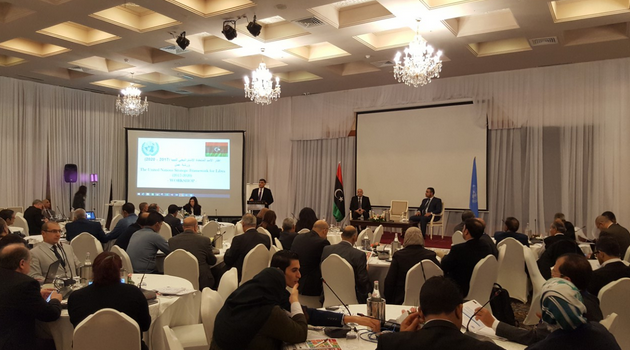United Nations discusses its 2017-2020 Strategic Framework with Libyan officials and civil society
The United Nations Agencies, Funds and Programmes working in Libya gathered with national officials and representatives of the civil society on Wednesday 14 December, to discuss the UN Strategic Framework for Libya (UNSF) 2017-2020.
“The UNSF is the key programmatic document outlining the shared objectives of the UN System in Libya, the areas in which it intends to support the Government as well as its people, the next four years, towards stabilization, recovery and development in Libya” said Dr. Jaffar Syed Hussain, UN Resident and Humanitarian Coordinator ad interim.
“The new set of priorities have been developed based on thorough analysis of conflict dynamics and needs in Libya and the possible drivers of change capable of moving the country from fragility into resilience.”
Areas like inclusive politics, achieving reconciliation, addressing social inclusion and equity among regions and social groups, recognition for rights of minorities, combating vulnerability, are key elements of the Strategic Framework, proposed for the discussion with Libyan officials and civil society.
“The draft Strategic Framework we are presenting today to our Libyan partners is the result of the efforts of the UN Programme Management Team (PMT). We have been working for over 6 months in consultation with Libyan counterparts with the aim of better serving the Libyan people and helping them recover from the crisis through consolidated transition towards sustainable development” highlighted Dr. Ghassan Khalil, UNICEF Special Representative and Chair of the UN PMT.
The document is built around three priority areas:
- Supporting the “take-off’ stage of the Government with an interim development policy framework, leading to effective and accountable institutions;
- Assuring readiness and responsiveness of targeted national and sub-national institutions and improving their performance so as to enhance basic service delivery and their capacity to contribute to social cohesion and conflict prevention;
- Promoting democratic principles of governance enforcing supremacy of law and ensuring human rights based development for all.
“National ownership is key, and for this reason the United Nations is aligning its plans to the priorities of the Libyan society” said Mr. Essam Garbaa, Director of the Technical Cooperation Department at the Ministry of Planning, “The recommendations formulated and the feedback provided today by Libyan partners would inform the actions of the United Nations in Libya in the next four years and will be incorporated in the United Nations Strategic Framework 2017-2020. I urge all partners to develop plans with measurable indicators to better assess the impact of our plans ” he added.
Once finalized and endorsed, the United Nations Strategic Framework 2017-2020 will represent the assurance of United Nations’ commitment to support the Government of Libya and the Libyan people in their peace, security and socio-economic development aspirations.
(Source: UN)





